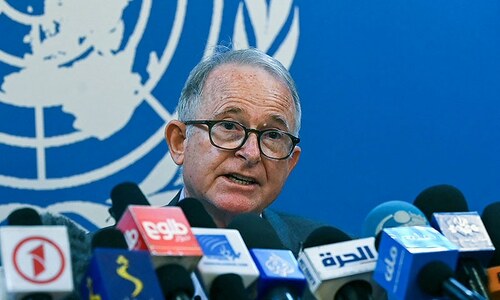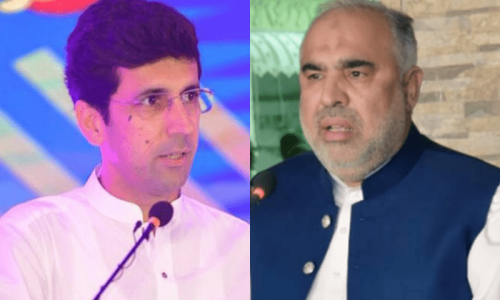IT is a year since the Taliban stormed Kabul to retake control of Afghanistan some two decades after the conservative Islamic regime was routed by American forces following the events of 9/11. It was a return of the old order though with the promise of some moderation.
Unfortunately, the Taliban regime has fully reverted to its old ways.
While the war has ended and there is relative peace, Afghanistan is witnessing a great leap backward as fundamental human rights are severely curtailed. The international community may have remained engaged with the Taliban administration but there is no sign of their recognising them formally.
The Taliban’s own intransigence, fostered by the hard-liners among them, regarding women and other human rights as well as their constant violation of the promises made have stood in the way of formal recognition by the international community, besides being a cause of serious concern even to those countries that had been in favour of a more lenient approach towards them.
Thus, a year down the road, the country continues to face international isolation as the Taliban, who favour a strict interpretation of religious law, have gone back on their pledges to moderate their stance on women’s education and women in government offices, among other things.
The regime’s dreaded Ministry for the Propagation of Virtue and the Prevention of Vice is back in action. Besides, Taliban officials have also banned women from travelling in taxis, unless a male family member accompanies them, for a distance greater than 72 kilometres. Such actions remind one of the strict rules framed and enforced by the Taliban regime of Mullah Omar before 9/11.
Those who were hailing the Taliban takeover of Kabul last year should be over their euphoria by now.
Finding themselves under international pressure, the Taliban had earlier announced they would reopen high schools for girls but reversed their decision quickly, shattering the dreams and aspirations of a million girl students who were excited about returning to their studies.
The rationale given by the Taliban’s education authorities for their action was that a plan built on Islamic principles was to be drawn up to reopen the schools; until such time, girl students would not be able to access these schools. Some officials are even said to have said that religion asserts that Muslim women receive limited education. There is no time frame as to when these schools will reopen.
Clearly, this reversal of the decision to reopen girls’ high schools shows that the hard-liners call the shots in the ruling administration and control its leadership. The move came following a council meeting. Meanwhile, in their ongoing attempt to stamp their conservative writ, the regime has also imposed restrictions on the media in the country and have cracked down on peaceful protests.
Such moves only make one thing clear: the Taliban want their obscurantist views to prevail over international engagement, and in order to do so, the radicals among them have no qualms about sidelining the more moderate Taliban elements. Such an approach will surely spell doom for a country already in the throes of multiple economic, social and political challenges.
There seems to be little realisation among Taliban ranks that the country’s problems cannot be successfully solved while Afghanistan remains isolated from the rest of the world which is not willing to accept a retrogressive regime that thwarts fundamental human rights and equal rights for women.
Editorial: Forgotten Afghans
In spite of some humanitarian aid from the international community, which helped to alleviate last winter’s misery in Afghanistan, the crisis is far from over. Increasing international isolation will only worsen the regime’s predicament.
With such scant regard for human rights, including the Taliban’s U-turn on ensuring that girls receive an education — a key condition of potential donors if Afghanistan is to receive foreign aid and recognition — it is unlikely that donors will come forward. The regime’s actions could cost it millions of dollars in foreign aid.
More worrying are reports of transnational militant groups resurfacing in Afghanistan and presenting a serious threat to regional security. The presence of Al Qaeda chief Ayman al-Zawahiri in Kabul, where he was apparently living under the protection of the Taliban interior minister, means that the worst fears of Afghanistan once again becoming the centre of militant activities are coming true. He was killed in a US drone strike in a highly protected upscale neighbourhood of the capital.
The increasing frequency of Zawahiri’s video and audio messages had reinforced suspicions about his presence in the country. His killing has come as a serious blow to the Taliban government which had given its commitment to the international community to not allow any militant activity on Afghan soil. It is apparent that a faction of the Taliban refused to break its ties with the global terrorist network.
Besides Al Qaeda, there are militant groups like the Tehreek-i-Taliban Pakistan (TTP) and the East Turkestan Islamic Movement that continue to use Afghanistan as a base for their cross-border operations and are a source of serious concern to Islamabad and Beijing, the two capitals which have been urging the international community to maintain close contact with the Taliban administration.
There has been a marked increase in militant activities attributed to the TTP in Pakistan’s former tribal regions and other parts of KP. The militant attacks have taken the lives of scores of Pakistani soldiers over the past one year. Instead of taking action against the terrorist sanctuaries, the Taliban have been calling Pakistan to negotiate peace with the terrorist group.
It’s apparent that the TTP is being protected by the Haqqani faction of the Afghan Taliban. The initial euphoria among a section of the Pakistani ruling elite after the Taliban took Kabul last year should have vanished with the spillover effects of the conservative regime in the country.
One year on, the Taliban regime in Afghanistan may not be facing any organised resistance yet with its backward actions, public discontent has been rising and could take the form of a strong movement. Moreover, the Taliban’s protection to transnational militant groups could cause its further international isolation.
The writer is an author and journalist.
Twitter: @hidhussain
Published in Dawn, August 11th, 2022
















































